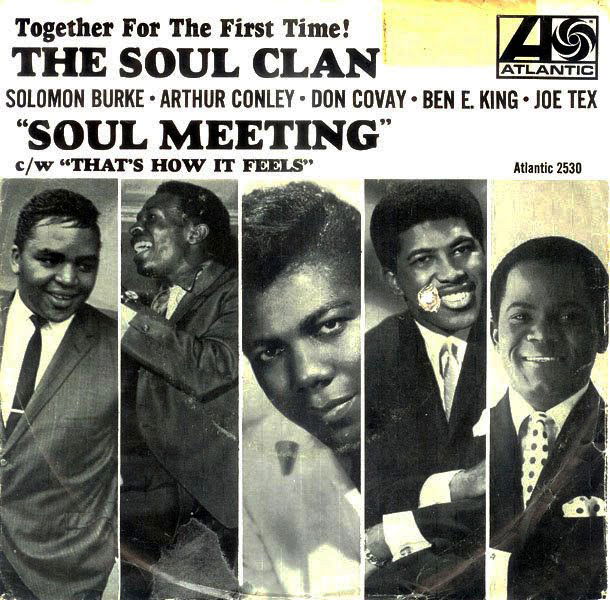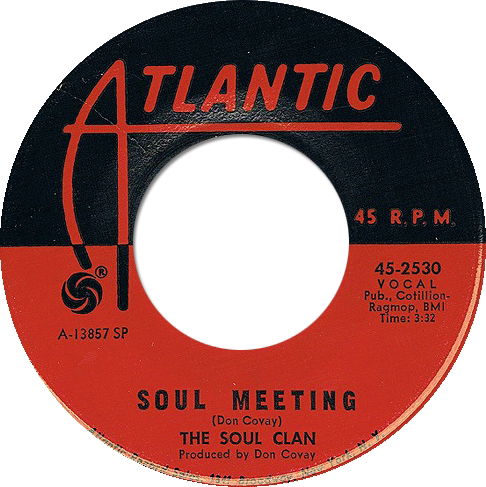THE SOUL CLAN

In 1966, Solomon Burke joined his fellow Atlantic artists Don Covay, Wilson Pickett, Otis Redding, and Joe Tex to form the Soul Clan. For Burke, it was “an expression of solidarity and mutual support by five pillars of soul music.” He saw the collective as a stepping stone toward an autonomous African-American business empire. Along with music, the Soul Clan would encompass (among other things) real estate, schools, Black-owned restaurant franchises, and healthcare benefits for older Black musicians. According to Burke, “We wanted to interlock ourselves as a group, to express to the younger people how strong we should be and to help one another, work with one another, and support one another.”
Burke and Company requested $1 million in seed money from Atlantic, but the company said no. Not only did that hold up the project, but recording was delayed as Redding recovered from throat sugrery. When he was killed in a December 1967 plane crash, Arthur Conley (“Sweet Soul Music”) replaced Redding. Ben E. King then took over for Wilson Pickett, who was “supposedly uncomfortable with Burke’s grandiose financial plans.”
On February 6, 1968, the Soul Clan recorded a single, “Soul Meeting” / “That’s How It Feels.” In his book Sweet Soul Music, Peter Guralnick wrote, “The singers never did get to actually meet in the studio...but instead recorded their vocals separately to a backing track which Covay had put together with Bobby Womack.”
“Soul Meeting” reached #34 on Billboard magazine’s Rhythm & Blues singles chart in July 1968. The following year, Atlantic released an album, The Soul Clan, which included both sides of the single and solo tracks from the individual members.
Despite the single’s succes, Burke insisted that it “was stopped and banned. We were going against the grain of what Black entertainers are supposed to do. We were all just supposed to go out and buy red Cadillacs. We weren’t supposed to go out and start talking about spending millions of dollars on building and developing. We were supposed to talk about having parties and good times and eatin’ barbecue ribs.” Burke left Atlantic shortly after.
According to writer Rob Whatman, Atlantic treated the singers poorly: “Times were changing, and none of the final line-up of the Soul Clan were experimenting with, nor being encouraged to try, the new sounds of funk that might have boosted and elongated their hit careers. Atlantic Records was happy to let them fade away, while sucking up the back catalogues and talents of regional hit factories such as Stax. No Marvin Gayes or Stevie Wonders would be nurtured in New York City.”
The Soul Clan broke up in 1969, but reunited in the summer of 1981 for a sold-out show at the Savoy Theater in Manhattan. Wilson Pickett stepped in for Arthur Conley, who had moved to Europe. After a tumultuous show plagued with dead mikes, a broken sound system, band miscues, and unauthorized backstage personnel, the Soul Clan canceled plans for a national tour and never performed together again.
In 1997, the Rhino label put out a six-CD collection, Beg, Scream and Shout! The Big Ol’ Box of ‘60s Soul. The Soul Clan’s “That’s How It Feels” kicked off the first disc.
Of the seven members, Otis Redding died in 1967, Joe Tex in 1982, Arthur Conley in 2003, Wilson Pickett in 2006, Solomon Burke in 2010, Ben E. King in 2015, and Don Covay in 2016.
Charted single:
“Soul Meeting” (1968) R&B #34, Pop #91

